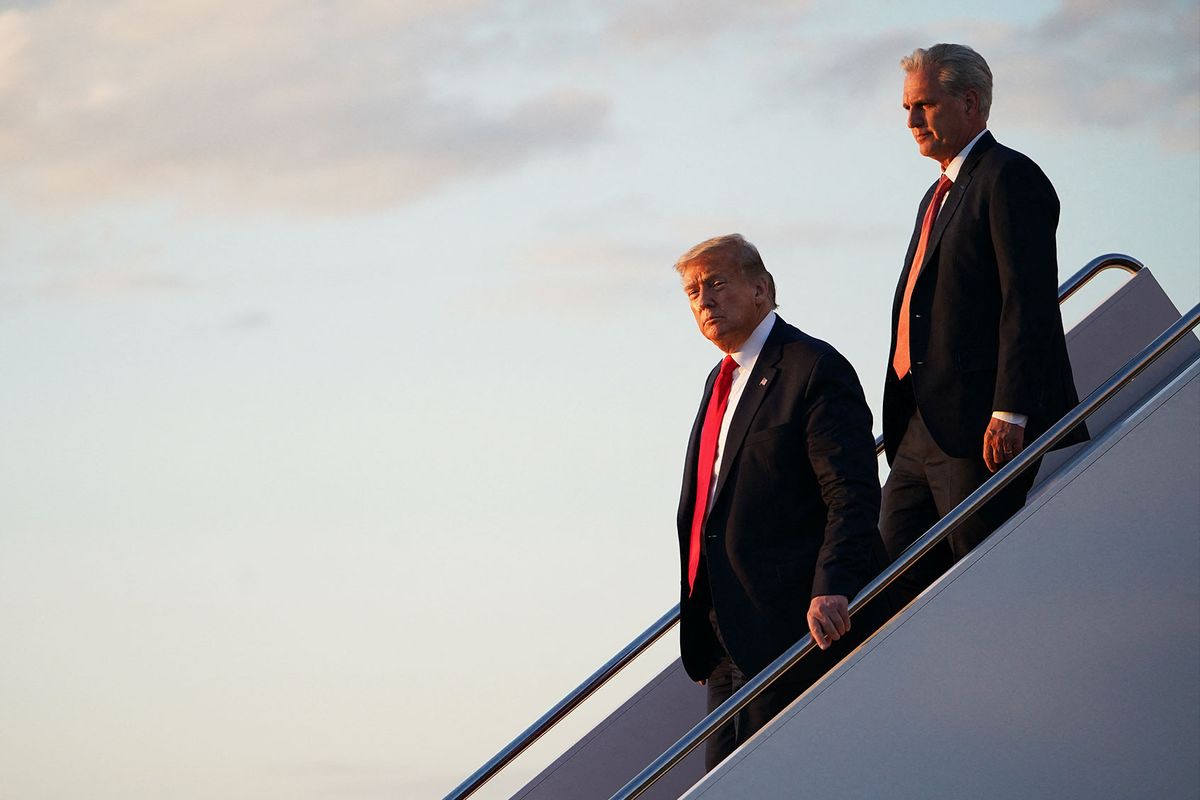When Donald Trump acknowledged in a Fox News town hall on Tuesday his intent not to abuse power as retribution against anybody, “except for Day One,” he was doubling down on a tried and true strategy of 20th-century dictators. As NYU professor Ruth Ben-Ghiat, author of “Strongmen,” wrote years ago about Trump’s wild statements, he is “introducing an idea that is reprehensible to the values of liberal democracy, framing it as an off-the-cuff remark or even as a joke.” Meanwhile, she notes, “it cannot be unheard.”
The message is that his followers, like those in a cult, can experience power through their leader.
We’ve seen Trump retreat plenty of times when he got pushback for saying the quiet part out loud. Recall early in the Covid crisis when he said there should be less testing so public health officials reported fewer cases in an election year. When a public chorus of boos erupted, he said he was just joking.
It’s a common strategy for rising authoritarians to float “trial balloons” to see what they can get away with, as Professor Ben-Ghiat explained:
[A]nti-democratic rulers have always “tested” . . . the public and the media as they consolidate their power, saying things that “push the envelope” against democratic norms to the point of raising the idea of extralegal or irregular action.
On Tuesday, Trump’s statement about dictatorship to his ally Sean Hannity drew applause from the Fox News audience that loves him. But whether his balloon flies across America depends on pushback from the rest of us, including the media.
We need your help to stay independent
Before coming back to that, let’s note another communications theme at play here. Trump was not only doubling down on a familiar messaging strategy; he was also tapping into a strong undercurrent in the electorate — and himself — about power and powerlessness.
First, he was appealing to the feeling shared by so many of his followers that they lack or are losing power and will regain it symbolically through him if he is elected. As Michael Bader, a Chicago psychologist who writes on the role of the American psyche in our public life, described in Salon on Sunday, Fox builds its audience by exploiting such feelings of powerlessness:
If helplessness is prominent in people’s experience of personal and social life then the resulting anxieties become fertile ground into which right-wing media can plant its conspiracy theories.
Those feelings work the same way for Trump as they do for Fox, and he knows it. Trump’s audience likes the idea of him becoming a strongman because, like other authoritarians, he appeals to them by telling them he will be "your voice," and “your retribution.” The message is that his followers, like those in a cult, can experience power through their leader.
A social science study of Trump voters in 2016 confirmed the effectiveness of the message, at least for men who felt powerless.
Second, he was compensating for his personal, characterological feeling of powerlessness – asserting unlimited future power to convince his doubting inner self to “fake it ‘til he makes it.”
To that point, Dr. Bandy Lee, a forensic psychiatrist and president of the World Mental Health Coalition, stated in a 2021 Scientific American interview that Trump “projects grandiose omnipotence” – as he just did this week with Hannity – because he is “hungry for adulation to compensate for an inner lack of self-worth.”
Public response can help sidetrack a man who would be king, on “day one” and beyond.
Third, he was doing everything he could to make his eventual election and political omnipotence feel inevitable to his opponents, so they feel powerless trying to stop him. As professor Ben-Ghiat told Washington Post columnist Greg Sargent on Tuesday, authoritarians like Trump “create a climate where they seem unstoppable. Creating an aura of destiny around the leader . . . mak[es] his movement seem much stronger than it actually is.”
The aim, as Sargent elucidates, “is to hypnotize voters into forgetting the power and numbers that they possess, persuading them that politics is a hopelessly sordid and disappointing exercise. But that is not the story of the Trump years.”
Want a daily wrap-up of all the news and commentary Salon has to offer? Subscribe to our morning newsletter, Crash Course.
Nor is it the story of today — so long as people use their voices and we have the rule of law.
As one example, on Wednesday, news broke that in the settlement of a civil lawsuit brought by two of President Joe Biden’s 2020 electors in Wisconsin, 10 Trump “fake electors” confessed in public that the Big Lie in which they participated is, in fact, a lie. They acknowledged that Biden won the election and that they were not true electors.
The two citizens who brought that suit felt neither hopeless nor powerless in the face of Trump and his MAGA enablers' assault on the truth.
The criminal justice system, meanwhile, appears equipped to remedy Republicans’ attempted assault on democracy. On Wednesday, Nevada became the third state – joining Michigan and Georgia – to bring charges against fake pro-Trump electors, including the state’s GOP chair.
Crucially, hopelessness and powerlessness needn’t be the story of tomorrow either. As Timothy Snyder wrote in the very first chapter of his salutary 2018 handbook, On Tyranny:
Most of the power of authoritarianism is freely given. . . . A citizen who adapts [by offering himself without being asked] is teaching power what it can do.
Those who believe in a constitutional republic governed by the rule of law need not wait until election day to teach Trump that in America, dictatorship is not what power can do. Public response can help sidetrack a man who would be king, on “day one” and beyond.
Read more
about the threat Trump presents to American democracy



Shares